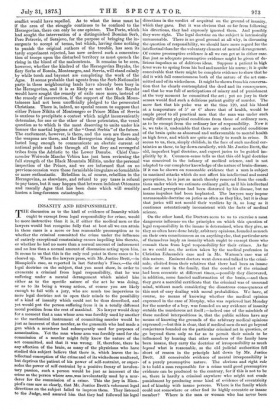THE RISING IN THE HERZEGOVENTA.
THE semi-official telegrams from Constantinople leave little unsaid to convey the impression that the troubles in the Herzegovina resolve themselves into simple reluctance on the part of the bold mountaineers tc pay their quota of taxation. This is a politic way of depicting the situation for Western observers, and it certainly has this in its favour,—that there is, in a sense, substantial truth at the bottom of the story. The months of June and July, indeed, it must be said, constitute a season of the Turkish fiscal year when risings in the wild countries which the littoral of Dalmatia shuts out from the Adriatic might almost be expected to recur summer after summer with a certain regularity. At least there is considerable regu- larity, or rather uniformity, in the proceedings which, whether followed or not by serious disturbances, are always of a nature to provoke them among milder-mannered men than the Rayahs of Bosnia and the Herzegovina. It is in the last weeks of June and the first of July that the Agas, or local magnates— of Turkish faith, but of native blood—go forth, accompanied by troops of retainers, attached to them half in a personal, half
in an official capacity, and ransack, we might almost say pillage, the country-side for the dues and tributes which imperial law or local tyranny has imposed upon the popula- tions. From village to village and from farm to farm the Agas extend their sinister march, assessing the imposts by a calculation of the taxpayer's resources under pressure, and enforcing their payment on the spot. When the cultivator is unable or unwilling to meet the exigencies of the Aga, he is summarily bound to a post, and beaten until he finds some means of appeasing the justice or cupidity of the Aga. If he continues to prove recalcitrant, his harvest is cut down and carted away, or his cattle driven off by the zaptiehs. This time the tax-collection was both more difficult and more bur- thensome than on recent occasions, in consequence of the Agas endeavouring to make the remaining inhabitants pay up the contributions alleged to be due by the two thousand Christian families who, ever since the sanguinary outbreak of Moslem fanaticism last year, have been refugees in Montenegro, Servia, and the Austro-Hungarian borderlands. The Herzegovina peasantry had been sorely tried enough by the losses caused by bad harvests and cattle-plague during the past season, to make it a matter of extra hardship for them to satisfy the ordinary exactions of the Agas. When, however, they found that their local tyrants expected them to make good the deficiencies in the yield of the imposts produced by the flight of the persecuted Rayahs, they were forced into a desperate situation, which easily suggested a desperate remedy, and the vindictiveness of the Agas quickly added fuel to the fire that had already so many combustible elements on which to feed.
Although the bulk of the refugees who had fled to the mountains after the massacres of last year continued to keep themselves and their flocks and herds out of the reach of their truculent masters, many of them remained temptingly close to their native valleys, and some even ventured to return to their homes. Though grudging the loss occasioned by their flight, the Agas and their retainers were unable to endure with patience the presence of their former victims, and renewed assaults, robberies, and murders gave token of a new outburst of Moslem fanaticism and greed. A regular chase of the Uskoks or returned Christian refugees from Montenegro was instituted, and woe to the unhappy wretch who fell into the hands of the Agas I This was naturally an aggravation even of the pecuniary grievance under which the Rayahs suffered, for they at once saw themselves compelled to make good the deficiencies arising from the flight of their countrymen, and the return of the defaulters prevented by the outrages of the Moslem mob and the zaptiehs or police agents. At the same time, it must be understood that the officials proper of the Turkish Government were usually guilty of nothing more than indolence and indifference to the atrocities of the Agas, and in many cases the Moslems of Ottoman stock distinguished them- selves, sometimes at deadly peril, by their exertions to restrain their co-religionists of Slav descent. Tripko Grubacic, one of the leaders of the refugees to Montenegro, having dared to return to the Herzegovina, was tracked out and surrounded by a mob of Mohammedans and asked to give a reason for his flight. "In order to escape from your brutalities," was Tripko's intrepid or foolhardy response, and he would have paid on the spot the forfeit of his life, if at this moment Gjuro Simovich, a Medschlis, or magistrate, had not interposed his authority. Turning from the pursuit of Tripko, the mob reproached Simovich bitterly with his unorthodox protection of a Christian "dog," and a few days afterwards the venerable Simovich was found murdered. A host of other assassinations are known to have occurred. The innkeeper Jola Gurdelja was killed because he had not refused food and shelter to refugees, although the poor man pleaded his obligation to supply the wants of travellers of every creed and nationality. Jovo Radmilovic, of Radina, was met by six " Turks," and butchered in cold blood. The peasant Bija Baushah was saluted with a passing volley from some "Turkish" wayfarers, as he stood in his field, and fell mortally wounded, in the midst of his peaceful husbandry.
There can be no doubt that the rising had assumed serious proportions at the date of the latest detailed correspondence from Cetinje and Serajevo. The Agas had everywhere sought the shelter of fortifications, and the open country was so com- pletely in the power of the insurgents, that Selim Pasha had apparently been unable to prevent the close investment of Mostar, the chief town of the Herzegovina. Several partial engagements between bands of the revolted peasantry and "Turkish" partisans have turned out in favour of the former, and these partial successes have attracted to the camps of the peasants many adherents whom a disastrous opening of the• conflict would have repelled. As to what the issue must be if the area of the struggle continues to be confined to the Herzegovina, there can only be one opinion. The Porte, which had sought the intervention of a distinguished Bosnian Serb, Pero Petrovic, of Serajevo, for the purpose of bringing the in- surgents to accept of terms, but which, having done nothing to punish the original authors of the trouble, has seen its tardy experiment rejected, has now ordered such a concentra- tion of troops upon the disturbed territory as must quench the rising in the blood of the malcontents. It remains to be seen, however, whether the kindred of the Herzegovina Rayahs, the fiery Serbs of Bosnia, Montenegro, and Servia, will stand calmly by while torch and bayonet are completing the work of the Agas. It seems probable that agents from the Serb Nationalist party in these neighbouring lands have already been busy in the Herzegovina, and it is as likely as not that the Rayahs would have sought the remedy of exile once more, instead of the remedy of insurrection, if the support of the Black Moun- taineers had not been unofficially pledged to the persecuted Christians. There is, indeed, no special reason to suppose that either Prince Nikita of Montenegro or Prince Milan of Servia is anxious to precipitate a contest which might inconveniently determine, for one or the other of these potentates, the vexed question as to which is the most deserving to unite under his banner the martial legions of the "Great Serbia" of the future. The excitement, however, is there, and the men are there and the weapons are there, and the Herzegovina rising has already lasted long enough to communicate an electric current of national pride and hate through all the fiery and revengeful tribes from the Adriatic to the Lower Danube. Chief Com- mander Woiwode Mascho Vrbica has just been reviewing the full strength of the Black Mountain Militia, under the personal inspection of the Prince, and we are informed that on no previous occasion were those formidable irregulars so formidable or more enthusiastic. Rebellion is, of course, rebellion in the Herzegovina, as elsewhere, and refusal to pay taxes is refusal to pay taxes, but it may happen that between indolent Ottomans and rascally Agas that has been done which will sensibly hasten a long-foreseen catastrophe.































 Previous page
Previous page